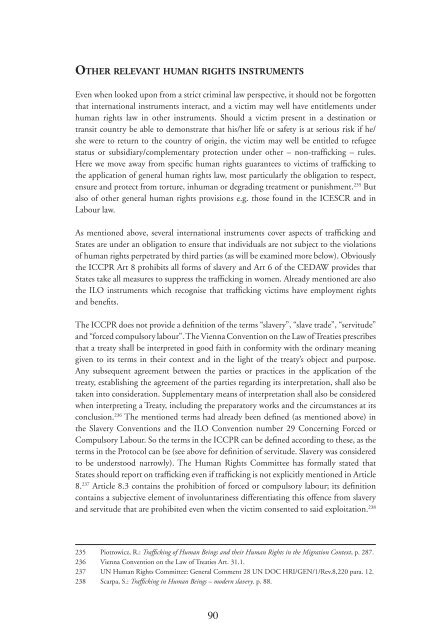Trafficking in human beings: human rights and ... - unesdoc - Unesco
Trafficking in human beings: human rights and ... - unesdoc - Unesco
Trafficking in human beings: human rights and ... - unesdoc - Unesco
Create successful ePaper yourself
Turn your PDF publications into a flip-book with our unique Google optimized e-Paper software.
OTHER RELEVANT HUMAN RIGHTS INSTRUMENTS<br />
Even when looked upon from a strict crim<strong>in</strong>al law perspective, it should not be forgotten<br />
that <strong>in</strong>ternational <strong>in</strong>struments <strong>in</strong>teract, <strong>and</strong> a victim may well have entitlements under<br />
<strong>human</strong> <strong>rights</strong> law <strong>in</strong> other <strong>in</strong>struments. Should a victim present <strong>in</strong> a dest<strong>in</strong>ation or<br />
transit country be able to demonstrate that his/her life or safety is at serious risk if he/<br />
she were to return to the country of orig<strong>in</strong>, the victim may well be entitled to refugee<br />
status or subsidiary/complementary protection under other – non-traffi ck<strong>in</strong>g – rules.<br />
Here we move away from specifi c <strong>human</strong> <strong>rights</strong> guarantees to victims of traffi ck<strong>in</strong>g to<br />
the application of general <strong>human</strong> <strong>rights</strong> law, most particularly the obligation to respect,<br />
ensure <strong>and</strong> protect from torture, <strong>in</strong><strong>human</strong> or degrad<strong>in</strong>g treatment or punishment. 235 But<br />
also of other general <strong>human</strong> <strong>rights</strong> provisions e.g. those found <strong>in</strong> the ICESCR <strong>and</strong> <strong>in</strong><br />
Labour law.<br />
As mentioned above, several <strong>in</strong>ternational <strong>in</strong>struments cover aspects of traffi ck<strong>in</strong>g <strong>and</strong><br />
States are under an obligation to ensure that <strong>in</strong>dividuals are not subject to the violations<br />
of <strong>human</strong> <strong>rights</strong> perpetrated by third parties (as will be exam<strong>in</strong>ed more below). Obviously<br />
the ICCPR Art 8 prohibits all forms of slavery <strong>and</strong> Art 6 of the CEDAW provides that<br />
States take all measures to suppress the traffi ck<strong>in</strong>g <strong>in</strong> women. Already mentioned are also<br />
the ILO <strong>in</strong>struments which recognise that traffi ck<strong>in</strong>g victims have employment <strong>rights</strong><br />
<strong>and</strong> benefi ts.<br />
The ICCPR does not provide a defi nition of the terms “slavery”, “slave trade”, “servitude”<br />
<strong>and</strong> “forced compulsory labour”. The Vienna Convention on the Law of Treaties prescribes<br />
that a treaty shall be <strong>in</strong>terpreted <strong>in</strong> good faith <strong>in</strong> conformity with the ord<strong>in</strong>ary mean<strong>in</strong>g<br />
given to its terms <strong>in</strong> their context <strong>and</strong> <strong>in</strong> the light of the treaty’s object <strong>and</strong> purpose.<br />
Any subsequent agreement between the parties or practices <strong>in</strong> the application of the<br />
treaty, establish<strong>in</strong>g the agreement of the parties regard<strong>in</strong>g its <strong>in</strong>terpretation, shall also be<br />
taken <strong>in</strong>to consideration. Supplementary means of <strong>in</strong>terpretation shall also be considered<br />
when <strong>in</strong>terpret<strong>in</strong>g a Treaty, <strong>in</strong>clud<strong>in</strong>g the preparatory works <strong>and</strong> the circumstances at its<br />
conclusion. 236 The mentioned terms had already been defi ned (as mentioned above) <strong>in</strong><br />
the Slavery Conventions <strong>and</strong> the ILO Convention number 29 Concern<strong>in</strong>g Forced or<br />
Compulsory Labour. So the terms <strong>in</strong> the ICCPR can be defi ned accord<strong>in</strong>g to these, as the<br />
terms <strong>in</strong> the Protocol can be (see above for defi nition of servitude. Slavery was considered<br />
to be understood narrowly). The Human Rights Committee has formally stated that<br />
States should report on traffi ck<strong>in</strong>g even if traffi ck<strong>in</strong>g is not explicitly mentioned <strong>in</strong> Article<br />
8. 237 Article 8.3 conta<strong>in</strong>s the prohibition of forced or compulsory labour; its defi nition<br />
conta<strong>in</strong>s a subjective element of <strong>in</strong>voluntar<strong>in</strong>ess differentiat<strong>in</strong>g this offence from slavery<br />
<strong>and</strong> servitude that are prohibited even when the victim consented to said exploitation. 238<br />
235 Piotrowicz, R.: Traffi ck<strong>in</strong>g of Human Be<strong>in</strong>gs <strong>and</strong> their Human Rights <strong>in</strong> the Migration Context, p. 287.<br />
236 Vienna Convention on the Law of Treaties Art. 31.1.<br />
237 UN Human Rights Committee: General Comment 28 UN DOC HRI/GEN/1/Rev.8,220 para. 12.<br />
238 Scarpa, S.: Traffi ck<strong>in</strong>g <strong>in</strong> Human Be<strong>in</strong>gs – modern slavery. p. 88.<br />
90

















